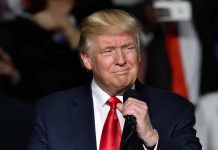
The largest fentanyl bust in Sinaloa has sparked a wave of international pressure, with the United States urging Mexico and Canada to take definitive action against drug trafficking and illegal immigration.
At a Glance
- Mexican security forces seized over a ton of fentanyl totaling 20 million doses
- U.S. President-elect Donald Trump threatens tariffs on Mexico and Canada
- Pressure on Mexico and Canada to enhance drug and immigration enforcement
- Increased rewards for capture of drug cartel figures
Historic Fentanyl Seizure
Mexican security forces recently captured over a ton of fentanyl, marking a record-breaking synthetic opioid seizure. The seized quantity, equivalent to 20 million doses and valued at nearly $400 million, demonstrates the scale of cartel operations in Sinaloa, a region infamous for drug trafficking. This operation underlines the commitment of Mexico’s new president, Claudia Sheinbaum, to dismantling these violent networks.
This considerable seizure coincides with the imminent inauguration of U.S. President-elect Donald Trump, who has announced a 25% tariff threat against Mexico and Canada. His administration demands more rigorous measures against illegal immigration and drug trafficking if they neglect to address these burgeoning issues. Such actions indicate the priority the U.S. places on its drug crisis, which claims approximately 70,000 lives yearly due to substances like fentanyl.
Mexican troops have seized a record amount of fentanyl pills in Sinaloa, worth nearly $400 million.
This bust follows US President-elect Donald Trump's threat to impose tariffs on Mexico and Canada unless they curb the flow of illicit drugs and migration.https://t.co/J7PyZWGa2e
— euronews (@euronews) December 5, 2024
Regional and International Implications
The operation not only involved the monumental fentanyl seizure but also resulted in the confiscation of other contraband, including chemical precursors, mixers, and scales. Additionally, Mexican authorities detained two individuals linked to fentanyl trafficking. Despite former President López Obrador’s denial of domestic fentanyl production, evidence and this seizure suggest otherwise.
“It is clear that the Mexican government has been managing the timing of fentanyl seizures.” – David Saucedo
In light of these developments, the U.S. increased a reward for the Jalisco cartel leader, seeking to curb major drug networks involved in fentanyl and meth distribution. Concurrently, Canadian Prime Minister Justin Trudeau engaged with Trump, promising to reinforce border security and sidestepping tariff implementation. Canada and Mexico aim to align enforcement strategies to maintain trade relations.
Ongoing Efforts and Challenges
Security analyst David Saucedo suggests U.S. pressure forces Mexico’s hand, given it “doesn’t see fentanyl as one of its own problems.” Nevertheless, Claudia Sheinbaum continues tackling drug-related violence, reporting indicators of progress, such as the capture of numerous traffickers and substantial drug seizures.
Mexican President Sheinbaum emphasizes that the historic fentanyl seizure stems from a long-term investigative effort, although the suspicious timing around Trump’s rhetoric hints at strategic orchestration. Authorities have also claimed the apprehension of many migrants to appease pending Trump administration policies on immigration control.
“These actions will continue until the violence in the state of Sinaloa decreases.” – Omar Garcia Harfuch
Navigating U.S. demands from Trump’s administration will challenge North American allies as they must balance domestic policies with maintaining robust international cooperation. The recent actions reflect a complex web of diplomacy, public safety, and trade relationships.

















